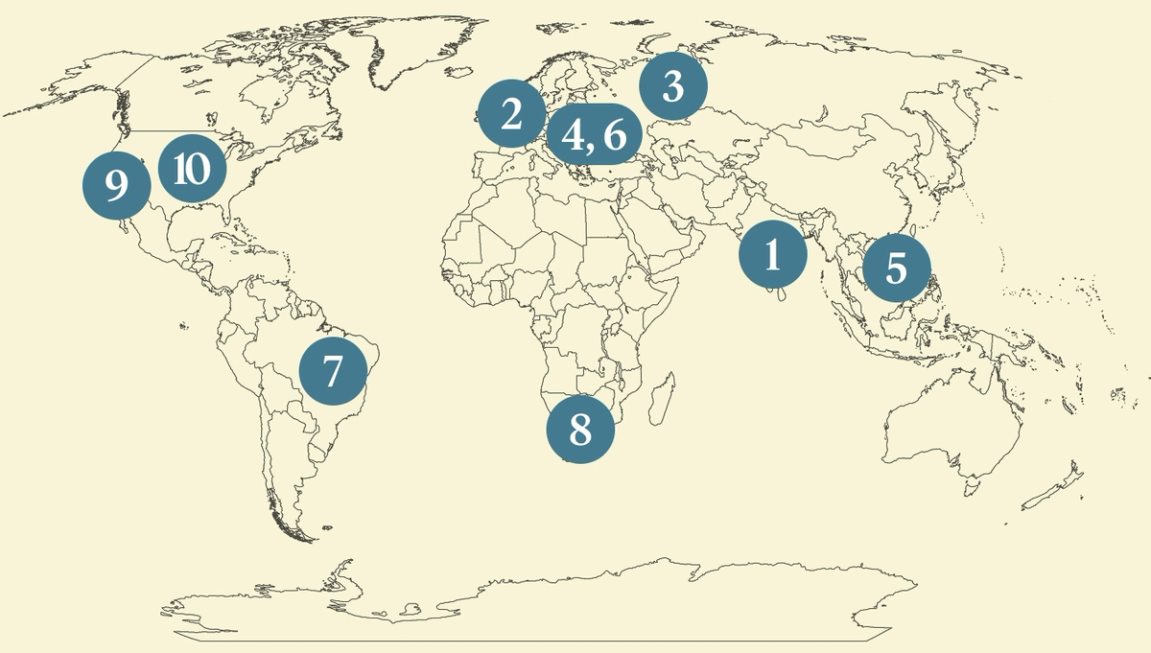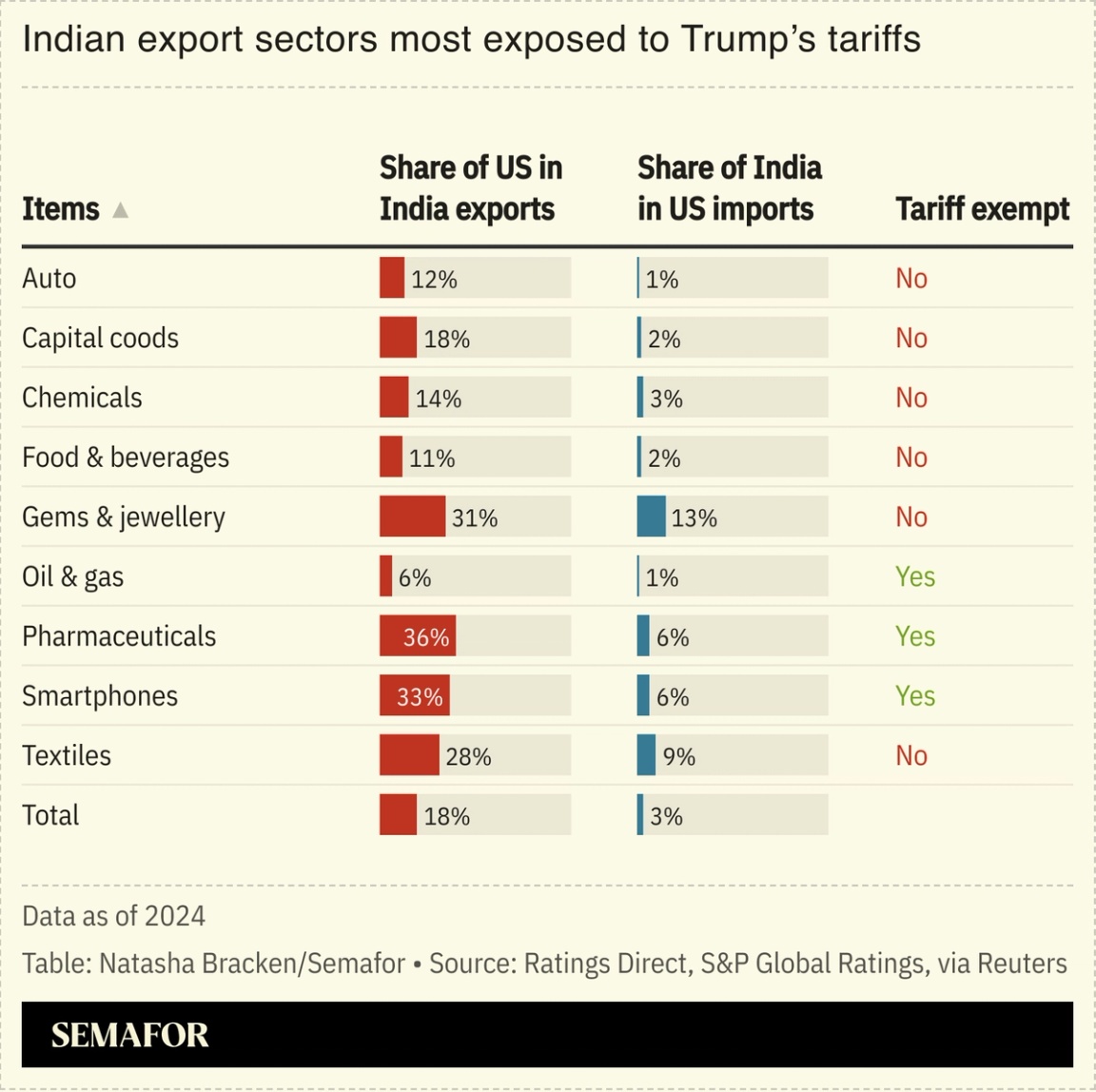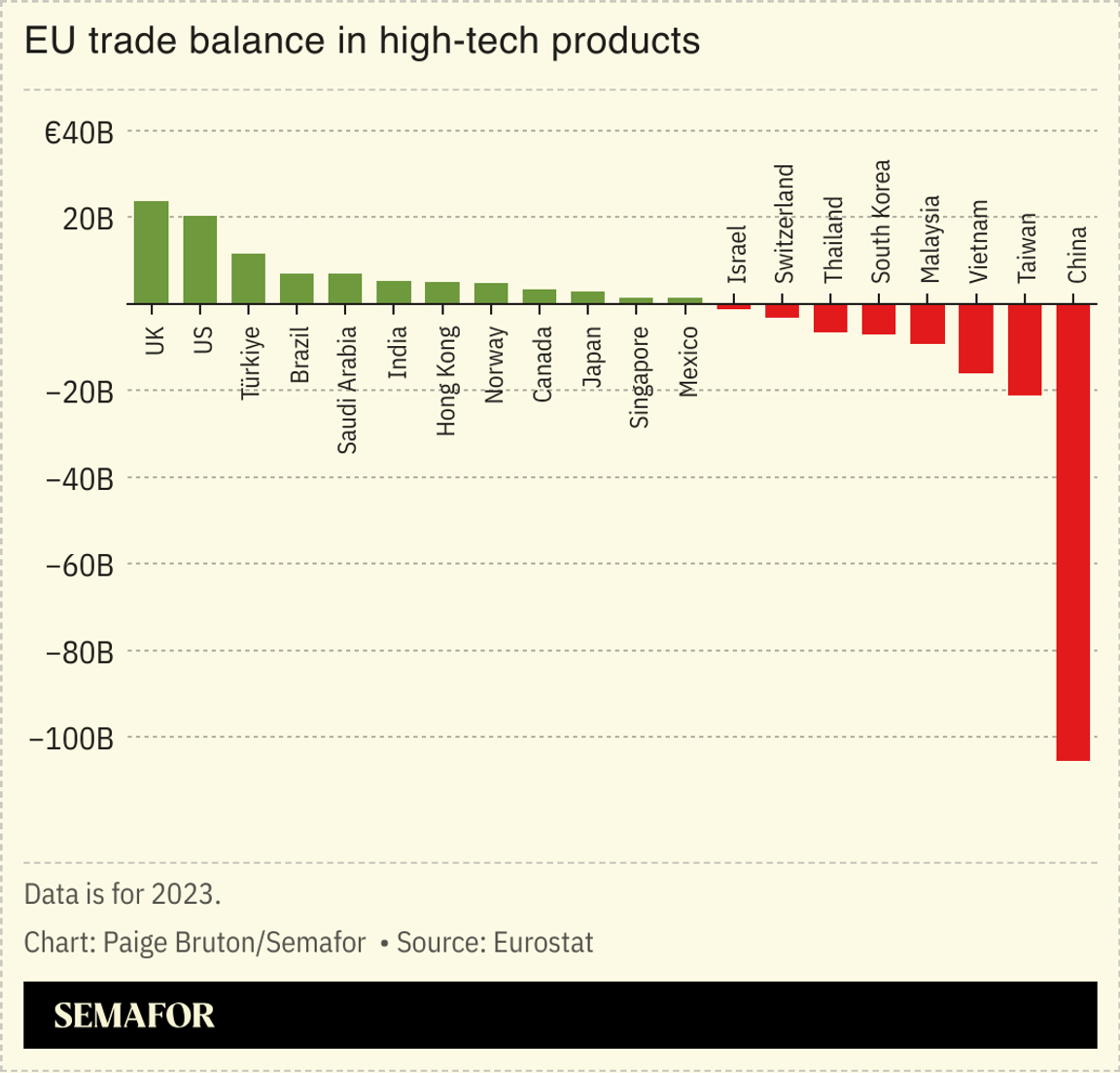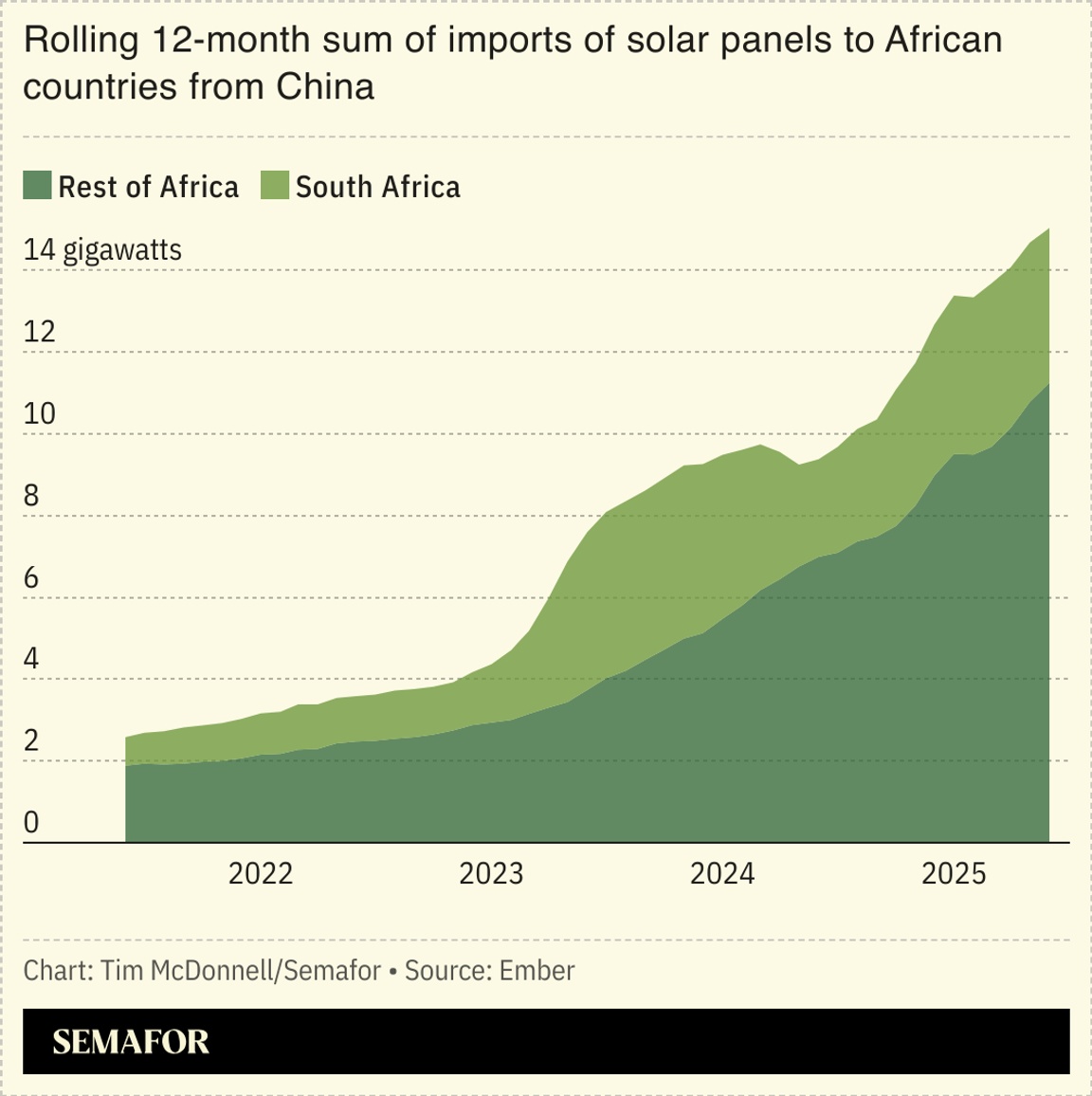| | New tariffs on India come into force, the EU hits back at new trade threats, and solar power booms i͏ ͏ ͏ ͏ ͏ ͏ |
| |   Moscow Moscow |   New Delhi New Delhi |   Cape Town Cape Town |
 | Flagship |  |
| |
|
The World Today |  - India tariffs come into force
- EU hits back at Trump
- US-Russia energy talks
- Russia’s gains in Ukraine
- South China Sea tensions
- Border inviolability eroding
- Bolsonaro curbs tightened
- Solar booms in Africa
- Starship’s successful test
- Tooth fairy unmasked
 A royal Range Rover is sold, and a recommendation for a new, dystopian novel. |
|
New US tariffs on India in effect |
 Hefty new US tariffs came into effect against India, part of efforts to drive New Delhi from Moscow which have thus far had the opposite effect. The 25% levy is intended as punishment for India’s purchases of Russian oil, and sits atop an existing 25% duty. Indian experts have noted that the tariffs are significantly higher than those against US rivals like Beijing, and rather than pulling New Delhi from Moscow, have instead driven efforts to improve ties with both China and Russia. Domestically, meanwhile, the levies have spurred an economic reform drive and pushed Indian firms to seek markets: “The Trump regime is, willy-nilly, helping India,” The Economic Times, a major Indian business outlet, argued in an editorial. |
|
EU hits back at Trump tariff threat |
 The European Union hit back at US threats of renewed tariffs over Brussels’ digital regulations, an early test of a recently unveiled framework trade deal. US President Donald Trump this week warned of “substantial” potential duties if overseas legislation affected American tech companies, an obvious reference to Europe, while Reuters reported the White House was weighing visa restrictions on EU officials. Trump’s missive fueled renewed frustration within Europe: Several politicians have grumbled that last week’s announced trade deal was one-sided towards Washington, and calls are growing to unleash the EU’s “trade bazooka” — a response it conceived during Trump’s first term allowing it to impose a huge array of economic sanctions if it is being coerced by another power. |
|
 Dado Ruvic/Illustration/File Photo/Reuters Dado Ruvic/Illustration/File Photo/ReutersUS and Russian officials and executives have reportedly discussed resuming energy cooperation as part of peace talks over the war in Ukraine. ExxonMobil has held talks with Russia’s biggest state energy company over returning to a mammoth gas project there, and has approached the Trump administration for support, The Wall Street Journal said, while Reuters reported that, on the sidelines of a US envoy’s trip to Moscow, the two countries considered several energy deals. Western companies left Russia en masse following the invasion of Ukraine in 2022, and the Kremlin has been keen to tempt them back. But firms are wary of an unpredictable legal situation, and a Russian official told Bloomberg in April that “nobody is knocking on the door yet.” |
|
Russia makes Ukraine gains |
 Maksym Kishka/File Photo/Reuters Maksym Kishka/File Photo/ReutersRussian forces made symbolic territorial gains against Ukraine, lending Moscow new bargaining chips in fitful peace talks. US President Donald Trump has pushed for an end to the war, but his calls for a summit involving Russia’s and Ukraine’s leaders have largely stalled. Trump has threatened “economic war” against Moscow if it does not make progress on the talks, and Washington has reportedly said it will provide aerial and intelligence support to a postwar Western force in Ukraine, but the Pentagon has in effect blocked Kyiv from carrying out long-range missile strikes against targets inside Russia, and Trump’s “performative diplomacy” is going nowhere, an analyst warned in Foreign Affairs: “In the Kremlin’s assessment, time is on Russia’s side.” |
|
South China Sea tensions rise |
 A China coast Guard ship navigating near the disputed Scarborough Shoal. Adrian Portugal/File Photo/Reuters. A China coast Guard ship navigating near the disputed Scarborough Shoal. Adrian Portugal/File Photo/Reuters.Vietnam accelerated island-building efforts in contested waters of the South China Sea, drawing a rebuke from Beijing and concentrating attention on a growing maritime dispute. China said it would take “necessary measures” to combat the Vietnamese effort, outlined in a recent US think tank report, insisting that the region was its “inherent territory.” Several Southeast Asian countries contest that interpretation, however, and have accused Beijing of using aggressive tactics to force them into giving up their maritime waters: This month, a Chinese naval destroyer came close to ramming a Philippine coast guard vessel, an incident that “underscores how a single miscalculation could spark a wider conflict,” a Bloomberg columnist warned. |
|
Century-old global taboo wanes |
 A Danish military boat in Nuuk, Greenland. Ludovic Marin/AFP via Getty Images A Danish military boat in Nuuk, Greenland. Ludovic Marin/AFP via Getty ImagesA hundred-year taboo against changing sovereign borders via the use of force is eroding worldwide, a leading historian of 20th century conflict argued, with worrying parallels to a past conflict. By and large, military invasions of prior decades were either repelled or were never recognized by the international community, but negotiations to end the Ukraine war that could see Kyiv give up land to Russia cement a deeper shift underway, Margaret Macmillan told the Foreign Affairs podcast. As a result, “we are seeing the emboldening of those who want to use military force to get what they want,” she said. That, Macmillan warned, mirrors a breakdown in the global order in the years prior to the First World War. |
|
Brazil tightens Bolsonaro curbs |
 Brazil’s former President Jair Bolsonaro stands at his home while under house arrest. Adriano Machado/File Photo/Reuters Brazil’s former President Jair Bolsonaro stands at his home while under house arrest. Adriano Machado/File Photo/ReutersA Brazilian Supreme Court justice placed former President Jair Bolsonaro under 24-hour surveillance, deeming the rightist ex-leader — who stands accused of orchestrating a coup — a flight risk. The new curbs come ahead of the opening next week of Bolsonaro’s trial, a case that has roiled Brazilian politics and upended the country’s relations with Washington: US President Donald Trump has deemed the prosecution a “witch hunt” and hit Brazil with 50% tariffs, despite the Latin American country having a trade surplus with the US. Domestically, the trial is expected to overlap with Brazil’s Independence Day on Sep. 7, a day which Bolsonaro’s supporters have used previously to take to the streets, potentially heightening tensions further, El País noted. |
|
 African countries are importing record volumes of solar panels from China to deploy for rooftop-power systems, new research showed. The continent has seen a 60% surge in imports over the past year, during which at least 25 African countries imported 100 megawatts worth of panels, indicating a significant broadening of access to renewable electricity: Just 15 countries met that threshold in the prior year, and few beyond South Africa have seen notable levels of rooftop solar installations, until now. The figures so far fall short of other emerging-market solar booms such as that which has been underway in Pakistan, but regardless, “the magnitude of these numbers is just huge,” the researcher behind the analysis told WIRED. |
|
Starship completes test flight |
 Steve Nesius/Reuters Steve Nesius/ReutersSpaceX completed a successful test flight of its Starship rocket, reversing a series of failed launches and putting the company back on track for a planned human mission to the Moon in 2027. Starship — the world’s largest and most powerful rocket — had seen several prior efforts end |
|
|